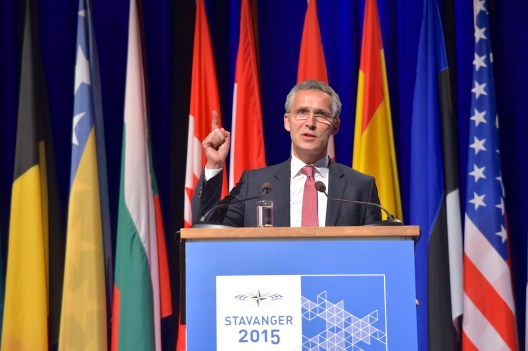 NATO’s deterrence is significant and it is real. If Turkey needs NATO’s help, NATO will be there.
NATO’s deterrence is significant and it is real. If Turkey needs NATO’s help, NATO will be there.
This instability which surrounds us is our new strategic reality, and it will be with us for the long-term. So our Alliance must also adapt to the long-term. I see three core issues as part of this, which I will briefly outline now….
First, we must modernise our deterrence. ‘Deterrence’ is often seen as some kind of old-fashioned, Cold War concept. But being strong enough to stop others from attacking you is not old fashioned. Being strong enough so that your people can go about their business without the fear of war is not old fashioned. We have strong forces not because we want to fight a war, but because we want to prevent war.
We face a wide and complex range of threats. Traditional and asymmetric. From the east and from the south. Even from cyber space.
If we are to respond to all of these, then we must modernise our deterrence. With better intelligence and early warning. A better integration of our land, sea and air forces. And significantly better cyber defences.
A strong defence is also key to addressing the second challenge Our relationship with Russia. There is no contradiction between being strong and being engaged. On the contrary, I believe that a strong defence forms the basis for a constructive relationship with Russia.
But there must be no doubt. Engagement is not the same as accepting a new status quo, or giving Russia a free hand. As we approach our Warsaw Summit, we will assess the long-term implications of the current crisis on our relations with Russia.
Then, the third important issue: the South. We face turmoil, violence and instability from Afghanistan, through the Middle East and across North Africa. This is a huge and complex challenge. A challenge that demands a comprehensive response, from the entire international community….
This is a huge task. And NATO has a role to play. NATO must be ready and able to deploy forces when needed. But we also have to get better at projecting stability without necessarily deploying large combat forces. Call it Resolute Support, Defence Capacity Building or Partnership. What matters is that from Afghanistan to Morocco, and many places in between, NATO is helping other countries to defend themselves. And to stabilise their own neighbourhoods. For if they are more stable, we are more secure.
By building up the capacity of countries like Tunisia, Jordan or Mauritania. Helping others, like Iraq and – at some point – Libya, to strengthen their security….
Our world is changing. NATO is changing. But what we have achieved so far is not enough. We need to do more.
Excerpts from keynote speech by NATO Secretary General Jens Stoltenberg at the NATO Parliamentary Assembly in Stavanger, Norway, Oct. 12, 2015.
Image: Secretary General Jens Stoltenberg at the NATO Parliamentary Assembly meeting in Stavanger, Oct. 12, 2015 (photo: NATO)
